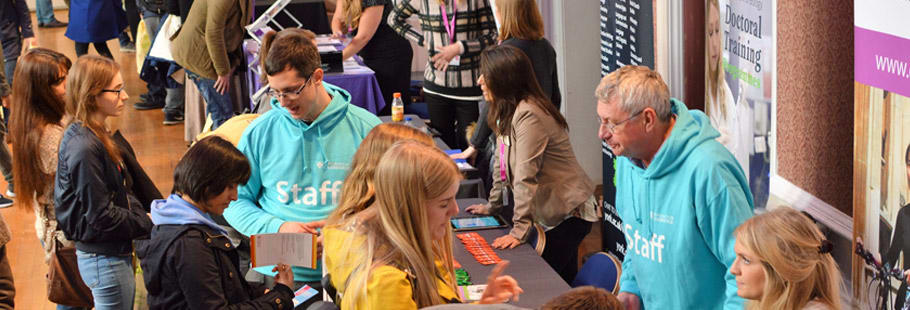9 Things You Might Not Know About PhD Fairs
PhD study fairs. You've probably heard of them.
But why should you bother travelling to a physical event and meeting universities in person, when you have the wonders of the internet, here, at your fingertips?
Well, as head of the content team here at FindAPhD, I'm a firm believer in the value of online resources for prospective students like you. It's my job to try and make those resources as useful as possible.
But I'm also involved in events like our specialist PhD LIVE fairs and I think they can be a great resource too. In fact, I honestly think you might be surprised at how useful these events can be - particularly if you're just starting to make sense of doctoral study.
So here, quickly, are a few things you might not know about PhD fairs:
#1 You can sign in without a pen
There's no need to waste time scribbling your details on a piece of crumpled paper and hoping your email address is legible when it's time for the great university you met to get back to you about that great programme you had that great chat about.
Instead we'll simply scan you on the way in, give you a unique barcode and let you use that to magically* leave your details with exhibitors.
*It's not really magic. It's technology.
#2 But everyone will give you a pen anyway
You're going to be taking a lot of notes during a PhD. A pen is going to come in handy. Lots of pens are going to come in even handier.
And, with 30 or more exhibitors at some of our PhD LIVE events this year, that's (potentially) 30 or more free pens. Nice.
The FindAPhD pens are the best though. They're purple.
#3 It's OK to leave your details
I'll be honest with you: we may have 30 or more specialised exhibitors at our PhD events - there to talk specifically about PhD study – but we can't fit that many full universities in one exhibition hall. That would be impossible.
Instead, universities send representatives to present at their stands. These will be people who know a lot about PhD study at that university, but they probably won't be the specific supervisor who deals with the specific subject, project or programme you're specifically interested in.
And that's OK. By leaving your details at the stand you'll make sure that specific supervisor can get back to you later. You can do that by quickly scanning your code. Or you can use one of the pens.
#4 There's a talks programme
This runs in parallel to the main fair, with a separate room set aside for presentations, panel discussions and Q&A sessions.
The talks cover the things we think you'll want to know about PhD study: how to apply (and how to ace your research proposal, where to start with funding, what it's like to study abroad in various countries and what to actually expect from a PhD once you've started.
What's more, you can chat to the compere.
#5 It's OK to ask about funding
Universities know funding is important to you. If you're genuinely interested in their PhD programmes, they'll try and help you with it. That probably won't mean pulling a full scholarship out from under their tablecloth, but they may still be able to set you on the right path to explore your options.
We know funding is important to you, too. And that's why we cover it, in detail, in the talks programme I mentioned before.
I'll be at all of this year's PhD LIVE events, covering the main sources of funding for PhD, including the brand new doctoral student loans, as well as Research Council studentships and more.
#6 It's OK to ask about anything, really
You are what matters at a PhD study fair.
The universities are there to meet you, talk to you and answer your questions. They are interested in what you're interested in. They want to see if what you're interested in can match what they're interested in and end up producing some great PhD research.
So ask about anything you're interested in.
#7 You can (and should) speak to universities you've never heard of
Fun game: see if you can name every UK university, without googling. I can't, and I work in higher education.
Chances are that even a specialised fair like PhD LIVE is going to feature two or three exhibitors you've never heard of. And that's part of the point.
The best university for your research area could be one you didn't know existed before you met them at a PhD fair.
#8 You'll have the chance to win things and claim freebies
Sadly, there are no rides at our fairs. But there are some prizes and giveaways.
This year we'll be providing free copies of our latest postgraduate funding guide, with contributions from special guest authors including all four Student Finance bodies, plus Study UK and UKRI (the people who fund those great Research Council studentships).
#9 A fair is a great way to start your PhD search
Don't be put off by the thought that study fairs are for people who know exactly what they want to research, and where. If anything, the opposite is true.
You don't need to have a specific university in mind to get something from a study fair – or be thinking about a specific PhD. In fact, you don't even need to be sure whether you want to do a PhD at all.
That's why we run events at the beginning of the academic year, when there's still plenty of time to think about your next step – and apply for 2020-21.
So. . . see you soon? Come say 'hi' and I'll give you a pen.
PhD loans
We'll be covering the new UK doctoral loans in detail at PhD LIVE. In the meantime, why not check out our online guide?
Explaining PhD 'impact'
Dr Alex Conner helps deliver the popular research proposal masterclass at our events. In this post he talks a little about 'PhD impact'.

 Continue with Facebook
Continue with Facebook





